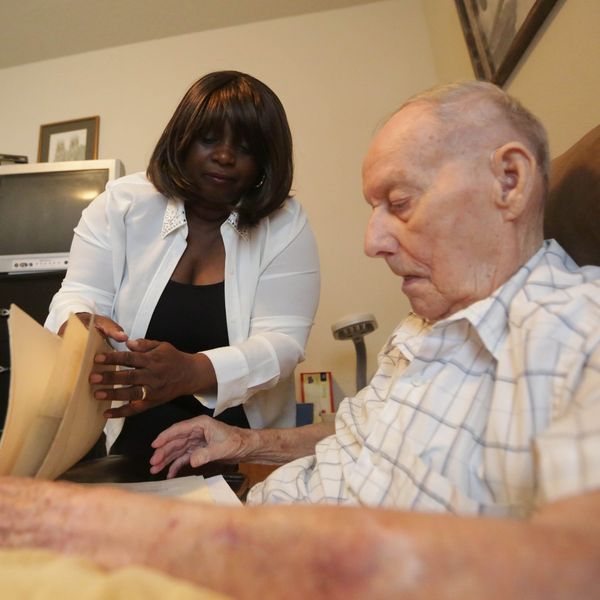Half a dozen Christmas packages lay in front of the fireplace in Eileen Merize’s home in Katy. There were some wrapped for her, others for her husband, Rudolph.
In the middle lay another, intended for a newer member of their family: 93-year-old Harold Utsler, the World War II veteran who moved in with them two years ago.
Utsler is one of three veterans who live in her home through the Medical Foster Home Program, a program through the U.S. Department of Veterans Affairs that helps disabled elderly veterans live with “foster families” rather than in large nursing homes.
Utsler and many of the other veterans who joined the program in Houston in recent years require nursing-home type care, but they would rather not live in a nursing home. Instead, Utsler spends his days in a private home with Merize, 58, and her husband.
He doesn’t have many people left in his life — his parents and siblings are dead, and though he was married twice, the unions didn’t stick. When a VA official suggested he move into a medical foster home, he was skeptical. But at Merize’s home earlier this month, he had a different take.
“They treat me like family,” he said, lounging on a puffy leather couch. He has his own room, with a photo of a B-24 like the ones he used to crew on the missions he flew from Italy and Romania.
“We have a knock-down-drag-out every once in a while, but we work it out,” said Utsler, a tall man with piercing blue eyes.
He likes to recount his days with the 376th Air Expeditionary Wing. He flew dozens of missions with the group before his superiors ordered him home to help with recruitment efforts.
Utsler’s experience is similar to that of hundreds of other aging veterans around the country who are unable to live on their own but don’t want to live in a nursing home, said Marie Jones, who coordinates the foster program at the Michael E. DeBakey VA Medical Center in Houston.
The program, now in its 15th year nationally, began accepting patients in Houston in 2011. Since then, 43 veterans here have been placed in medical foster homes, Jones said.
Before the VA signs off on foster families, their homes are inspected by a fire and safety inspector, nurse, social worker, dietitian and often a rehabilitation therapist, according to the VA. Caregivers undergo a rigorous screening process and FBI background check and receive routine unannounced visits, Jones said.
Nationally, nearly 900 veterans in 45 states are in the program, according to Daniel Goedken, national program manager for the Medical Foster Home Program. Since 1999, when the program was conceived, 2,689 veterans have been placed in homes.
Some stay with their foster families for years, Goedken said, noting one veteran who died recently who had lived with a family for 10 years.
The vet, who’d suffered from severe schizophrenia, didn’t have any family left.
“He died in his caregiver’s arms,” Goedken said. “You don’t find these individuals easily.”
About 120 VA facilities across the country have foster home programs funded or implemented, he said. VA officials hope to extend it to every VA facility and expand the programs already in place to accommodate more veterans. In Houston, seven medical foster homes are qualified to receive veterans, though Jones said she is looking for more.
Just down the block from Eileen Merize’s home, her sister, Yvonne Clarke, cares for Carl Monroe and two other veterans.
Monroe, who served in the Navy during World War II, lived in Chicago until his family members brought him to Houston.
He was living in a nursing home, but last year he fell and broke his hip. The nursing home told his family his care would cost an additional $2,000 a month, money they didn’t have.
Monroe wasn’t really a fan of the place. His wife had died in a nursing home. The food didn’t thrill him, nor did the setting. The Department of Veterans Affairs helped move Monroe into a foster care home.
“It’s a blessing how all this came together,” said Toni Watts, Monroe’s daughter.
In Clarke’s home, Monroe has his own room. Pictures of his parents, wife and children line the walls.
Foster homes can’t have more than three veterans living in them at a time. The VA covers the cost of care from nurses, doctors, nutritionists and physical therapists. The vets pay for their room and board and other expenses out of their disability benefits or their Social Security or other income.
VA officials say foster placements result in big cost savings. For example, the VA pays just over $50 on average, per day, for patients in foster care. The agency pays an average of more than $450 per day for veterans in nursing homes, Goedken said.
Merize decided to apply to house veterans after her children moved away. She’d worked in a nursing home during school and hadn’t liked the impersonal nature of it, she said.
Utsler was one of the first veterans to move into her home — she had cared for him for more than a year beforehand as a home health aide. It was a natural step inviting him to come live with her, she said.
Merize, Utsler and the two other veterans in her house have a daily routine. She wakes them in the mornings, takes their vital signs, helps them clean up and prepares breakfast. They like to watch TV. Sometimes they go for short walks or out to dinner.
“I believe they should be treated like human beings, and family,” Merize said of Utsler and the two other veterans living with her.
All content herein is owned by author exclusively. Expressed opinions are NOT necessarily the views of VNR, authors, affiliates, advertisers, sponsors, partners, technicians, or VT Network. Some content may be satirical in nature.
All images within are full responsibility of the author and NOT VNR.
Read Full Policy Notice - Comment Policy





























